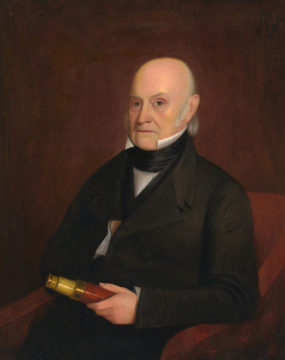by Michael Liss
However tiresome to others, the most indefatigable orator is never tedious to himself. The sound of his own voice never loses its harmony to his own ear; and among the delusions, which self-love is ever assiduous in attempting to pass upon virtue, he fancies himself to be sounding the sweetest tones. —John Quincy Adams, “Lectures on Rhetoric and Oratory: Delivered to the Classes of Senior and Junior Sophisters in Harvard University.”

Oh, my goodness, could that man talk. And talk. And talk some more. It might amuse you to know that, in the above quote, he was referring to his fellow lawyers.
So much you can say about John Quincy Adams. Annoying, crabby, bilious, voluble. Also, one of the most remarkable men ever to occupy the Oval Office—and even more to serve in the House of Representatives. A superb diplomat, who literally began his career at his father’s elbow prior to the negotiation of the Treaty of Paris, he served four Presidents (Washington, Adams I, Madison, and Monroe) as Ministers to the Netherlands, Russia, Prussia, and the UK. He was Monroe’s Secretary of State. During the wilderness that was Thomas Jefferson’s Presidency, he spent six years in the Senate. In typical Adams manner, he managed to irritate his own Federalist Party enough for them to deny him renomination. In 1824, he won the Presidency against three strong candidates, Andrew Jackson, Henry Clay, and William Crawford. None got a majority of the Electoral College, and the race was thrown into the House. There, Clay endorsed Adams, enraging Jackson supporters (who called it a “Corrupt Bargain” when Adams picked Clay for Secretary of State).
Adams was not as deft a President as he was a diplomat, and Jackson trounced him in a rematch in 1828, sending the then-61-year-old home to his failing farm in Massachusetts. He was not thrilled to be back in the Commonwealth; he sulked and became even more a pain until his own neighbors rescued him by sending him back to Washington as a Congressman. Read more »
